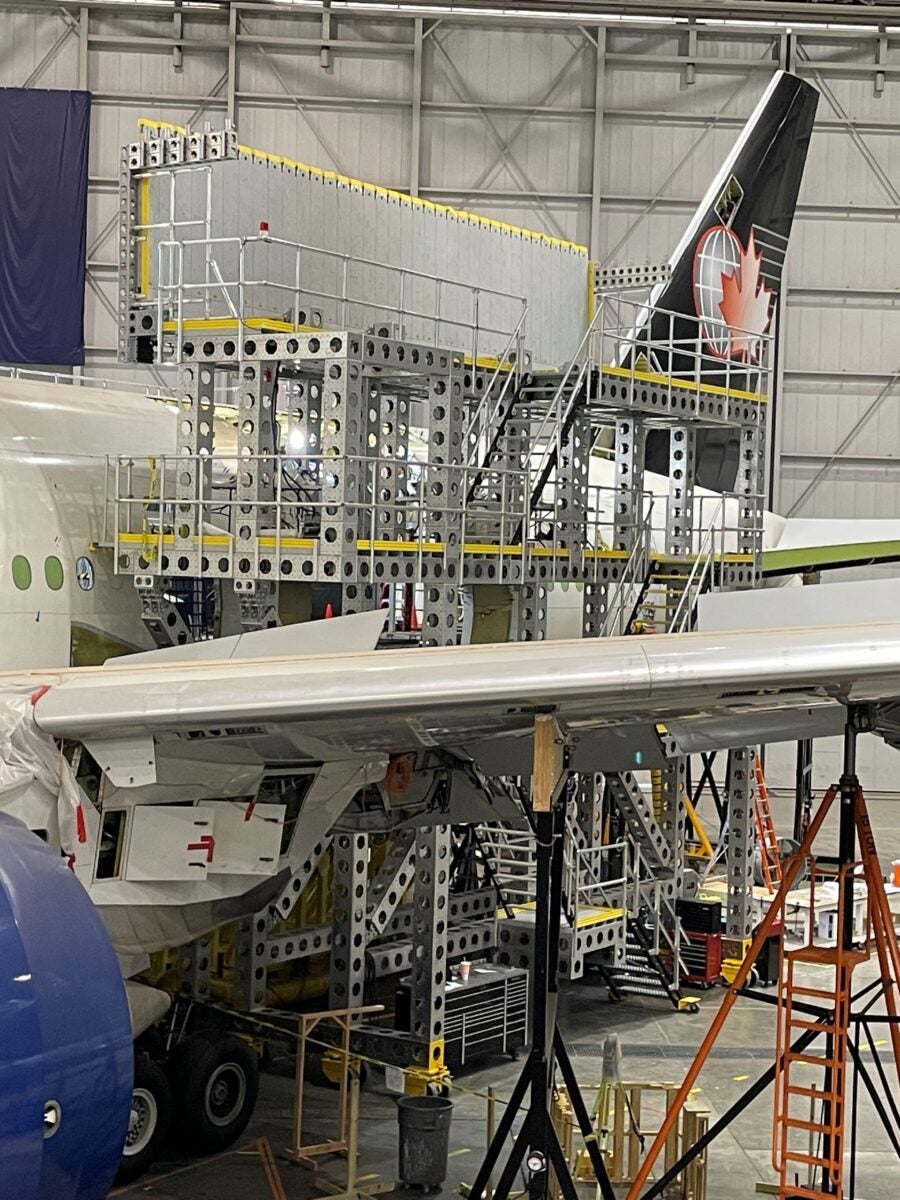Canada-based Cargojet announced Monday it has abandoned plans to add four Boeing 777 converted freighters because of lackluster demand for international shipping service so it can concentrate on using profits to reward shareholders and strengthen its balance sheet.
A statement by the Toronto-based airline suggesting it is canceling the order appeared at odds with the interpretation of Mammoth Freighters, the remodeler, which says Cargojet plans to fulfill its contract and subsequently dispose of the aircraft.
The decision means Cargojet (TSX: CJT), which operates a domestic express network in Canada for customers such as Amazon and DHL Express, will stick with its existing fleet of 40 Boeing 757 narrowbody and midsize 767 cargo jets after scaling back its fleet strategy for the third time in the past year. It joins a handful of other North American freighter operators that have recently changed direction on new aircraft investments or disposed of existing aircraft in response to weak market conditions.
“Forecasts continue to indicate that the international air cargo market will remain soft in the short to medium term and deploying B-777s into the market would not be strategically prudent. We have decided to exit our commitments for the four remaining B-777 aircraft, while continuing to flex our B767 fleet to accommodate our organic growth strategy,” said Executive Chairman Ajay Virmani, in the announcement.
The move translates to a slight pullback in Cargojet’s international business, which consists of long-term contracts providing outsourced aircraft, crews and maintenance, as well as short-term charters, to focus on the domestic overnight network as large customers require less frequent transport with subdued trade.
Cargojet was the launch customer for aerospace startup Mammoth Freighters, which has a contract to provide four Boeing 777-200 aircraft and modify them to carry containers on the main deck. Cargojet intended to operate the long-haul freighters for DHL Express, one of its main customers and a minority owner, but now says it can accomplish the task with 767s.
Two freighter conversions for Cargojet are three-quarters completed at Mammoth Freighters’ Fort Worth, Texas, facility — with paint jobs in the Cargojet brand — while the engineering firm strives to obtain certification later this year from the Federal Aviation Administration for the design changes to the 777-200 airframe.
“Cargojet remains fully committed to the development and build of these aircrafts. Mammoth Freighters is proceeding full speed with the final build and certification efforts,” Brian McCarthy, vice president of marketing and sales at Mammoth, told FreightWaves. The Canadian carrier has paid millions of dollars in deposits and progress payments, still controls the production slots and is responsible for making all payments through final delivery.

Cargojet said it pocketed $74.5 million to $82 million from the sale of the four 777-200s, after subtracting acquisition and other costs.
Mammoth Freighters has 35 firm orders for 777 conversions. In October, the first of six 777-300s to be retrofitted for AviaAM Leasing was inserted into Mammoth’s assembly hangar. DHL separately placed an order with Mammoth last spring for the conversion of nine 777-200s.
Cargojet last year exited commitments with Israel Aerospace Industries for the conversion of four 777-300 aircraft, which were aimed at international opportunities outside DHL. It subsequently sold three planes for $110 million and dropped plans for acquiring the fourth jetliner. Cargojet says it is retaining the rights to production slots for aircraft modifications at both companies in case market conditions improve enough to justify future investments.
In November, Cargojet said it planned to sell or lease four B757 cargo jets, after recently spending millions of dollars for passenger-to-freighter retrofits, because there wasn’t enough business to operate them economically in its domestic network.
Passenger-to-freighter conversions are complex engineering projects that include removing furnishings from the passenger cabin and installing a cargo door, rigid cargo barrier in front of the cockpit, reinforced floor and sidewalls, and a container handling system.
Cargojet in 2022 budgeted $1.2 billion for the 777 program. Last year it set aside $133 million in capital expenditures for growth. Management said Monday that projected capital expenditures for fleet growth in 2024 have been slashed to immaterial levels. Stated priorities include maintaining dividend growth and its share buyback program. Without the 777s, Cargojet will have lower costs for pilot hiring, training and maintenance associated with adding a new aircraft type to the fleet.
Cargojet owns two more 767 passenger aircraft and said it will defer their conversion to cargo configuration until demand improves.
Soft market conditions
Cargojet reported revenue in the third-quarter declined 8% to $155 million and adjusted earnings before accounting measures fell 17% to $50.6 million year over year. The airline flew 8.8% fewer hours during the period versus last year.
Starting in April 2022, the airfreight market contracted for 16 consecutive months as global supply chains stabilized from the Covid crisis, resulting in much less need for urgent air shipments. Air volumes fell 8.2% year over year in 2022 and are expected to be down another 4% to 5% for 2023, once results are tabulated, after a late rally. The downturn in demand coincided with a sharp increase in capacity as passenger airlines resumed international flying to more destinations, sending yields down more than 30%.
A growing number of freighter operators have responded by cutting capital expenditures to bolster cash flow. Miami-based Amerijet, squeezed by debt and sharply lower revenues, last week announced it will return six new Boeing 757 converted freighters to lessors. Air Canada in September canceled an order with Boeing for two 777 production freighters. Under pressure from investors, Air Transport Services Group, the largest lessor of freighter aircraft with two cargo airlines of its own, sharply cut back on planned capital expenditures despite confidence in long-term air cargo strength. And it is sitting on six second-hand 767s acquired for conversions until demand improves.
Virmani stepped down as CEO on Jan. 1 as part of a planned leadership transition. Long-time executives Pauline Dhillon and James Porteous are now sharing CEO duties.
Click here for more FreightWaves stories by Eric Kulisch.
(Correction: An earlier version of this story suggested Cargojet sold the 777-200s for more than $75 million. The figure actually represents the net proceeds from buying and selling the aircraft.)
RECOMMENDED READING:
Air cargo market: From ‘doom mongering’ to stability
Cargojet to sell off new B757 freighters, pause 767 conversions
Cargojet postpones more 777 freighters, tightens belt as shipments slow








